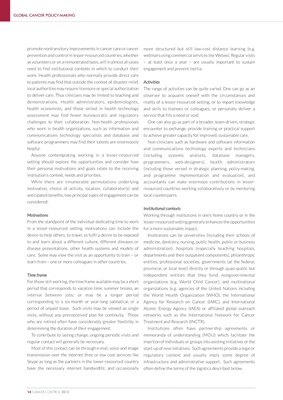
GLOBAL CANCER POLICY-MAKING
promote nontransitory improvements in cancer care or cancer more structured but still low-cost distance learning (e.g.
prevention and control in lesser-resourced countries, whether webinars using commercial services like Webex). Regular visits
as volunteers or on a remunerated basis, will in almost all cases – at least once a year – are usually important to sustain
need to find institutional contexts in which to conduct their engagement and prevent inertia.
work. Health professionals who normally provide direct care
to patients may find that outside the context of disaster relief, Activities
local authorities may require licensure or special authorization The range of activities can be quite varied. One can go as an
to deliver care. Thus clinicians may be limited to teaching and observer to acquaint oneself with the circumstances and
demonstrations. Health administrators, epidemiologists, reality of a lesser-resourced setting, or to impart knowledge
health economists, and those skilled in health technology and skills to trainees or colleagues, or personally deliver a
assessment may find fewer bureaucratic and regulatory service that fills a need or void.
challenges to their collaboration. Non-health professionals One can also go as part of a broader, team-driven, strategic
who work in health organizations, such as information and encounter to exchange, provide training or practical support
communications technology specialists and database and to achieve greater capacity for improved, sustainable care.
software programmers may find their talents are enormously Non-clinicians such as hardware and software information
helpful. and communications technology experts and technicians
Anyone contemplating working in a lesser-resourced (including systems analysts, database managers,
setting should explore the opportunities and consider how programmers, web-designers), health administrators
their personal motivations and goals relate to the receiving (including those versed in strategic planning, policy-making,
institution’s context, needs and priorities. and programme implementation and evaluation), and
While there are innumerable permutations underlying accountants can make enormous contributions in lesser-
motivation, choice of activity, location, collaborator(s) and resourced countries working collaboratively or by mentoring
anticipated benefits, two principal types of engagement can be local counterparts.
considered:
Institutional contexts
Motivations Working through institutions in one’s home country or in the
From the standpoint of the individual dedicating time to work lesser-resourced setting generally enhances the opportunities
in a lesser-resourced setting, motivations can include the for a more sustainable impact.
desire to help others, to travel, to fulfil a desire to be exposed Institutions can be universities (including their schools of
to and learn about a different culture, different diseases or medicine, dentistry, nursing, public health, public or business
disease presentations, other health systems and models of administration), hospitals (especially teaching hospitals,
care. Some may view the visit as an opportunity to train – or departments and their outpatient components), philanthropic
learn from – one or more colleagues in other countries. entities, professional societies, governments (at the federal,
provincial, or local level) directly or through quasi-public but
Time frame independent entities that they fund, nongovernmental
For those still working, the time frame available may be a short organizations (e.g. World Child Cancer), and multinational
period that corresponds to vacation time, summer breaks, an organizations (e.g. agencies of the United Nations including
interval between jobs; or may be a longer period the World Health Organization (WHO), the International
corresponding to a six-month or year-long sabbatical, or a Agency for Research on Cancer (IARC), and International
period of unpaid leave. Such visits may be viewed as single Atomic Energy Agency (IAEA) or affiliated global outreach
visits, without any preconceived plan for continuity. Those networks such as the International Network for Cancer
who are retired often have considerably greater flexibility in Treatment and Research (INCTR).
determining the duration of their engagement. Institutions often have partnership agreements or
To contribute to lasting change, ongoing periodic visits and memoranda of understanding (MOU) which facilitate the
regular contact will generally be necessary. insertion of individuals or groups into existing initiatives or the
Most of this contact can be through e-mail, voice and image start-up of new initiatives. Such agreements provide a legal or
transmission over the internet (free or low cost services like regulatory context and usually imply some degree of
Skype as long as the partners in the lower-resourced country infrastructure and administrative support. Such agreements
have the necessary internet bandwidth), and occasionally often define the terms of the logistics described below.
14 CANCER CONTROL 2013